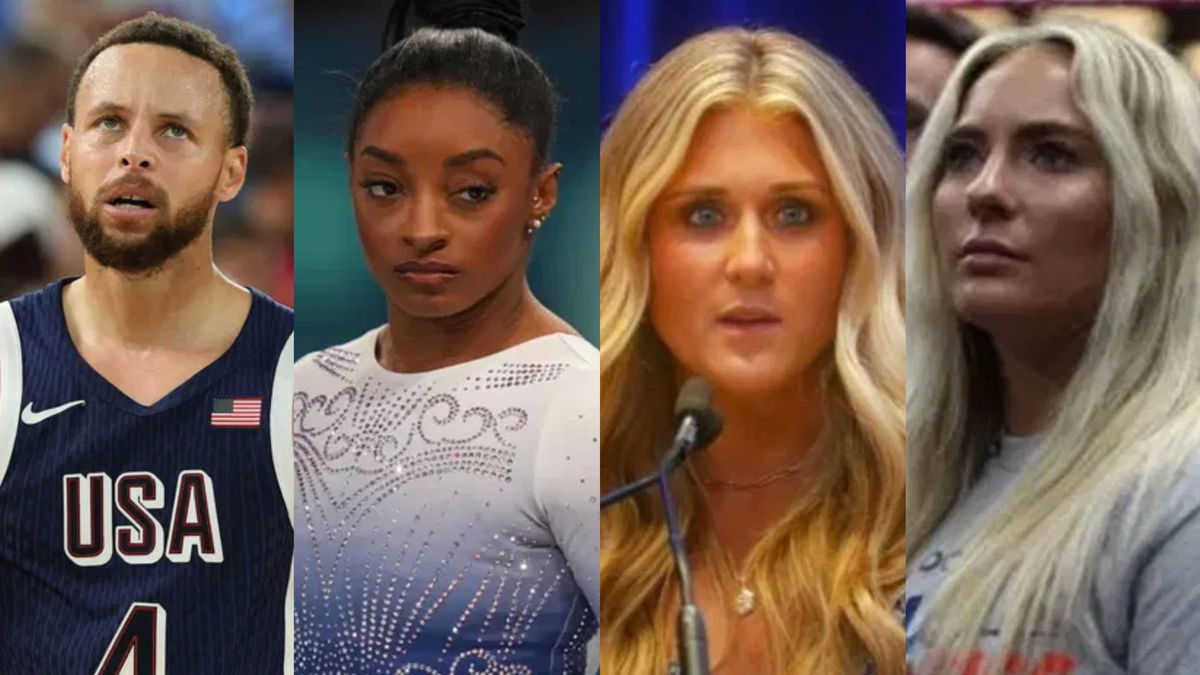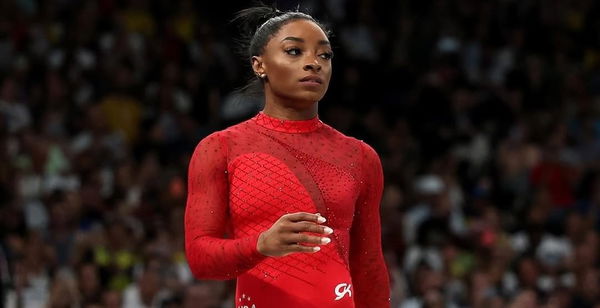
Imago
Stephen Curry, Simone Biles, Riley Gaines and MyKayla Skinner (Image Credits: IMAGO)

Imago
Stephen Curry, Simone Biles, Riley Gaines and MyKayla Skinner (Image Credits: IMAGO)
Draped in a navy gown and fresh off a sun-soaked vacation in Belize, Simone Biles stepped onto the ESPYs stage tonight with her usual poise. And as expected, a prestigious award in hand. The night had already crowned her as one of the evening’s biggest stars, but as she took the mic, it wasn’t just grace or gratitude that turned heads. A single line from her speech lingered…
Watch What’s Trending Now!
In recent weeks, Biles has found herself at the center of controversy. Riley Gaines, a former collegiate swimmer, publicly criticized her stance on transgender inclusion in sports. Not long after, MyKayla Skinner, a former U.S. gymnastics teammate, shared past frustrations in a social media post, describing interactions with Biles earlier in the year. While Biles has not addressed either of them directly, the timing of her ESPYs speech left some observers drawing their own conclusions.
It was against this backdrop that Biles delivered the line now widely interpreted as a probable jab. “Well, that was very unexpected, especially in a category of all men, so thank you guys so much,” she said, standing before a crowd of athletes, celebrities, and cameras. While the remark could easily be seen as a lighthearted nod to the male-dominated nominee list, it also sparked discussion online. A gesture to the recent controversies, a rebuttal crafted in public, under lights, in one of sport’s most visible arenas. However, regardless of intent, it marked a memorable moment in one of sport’s biggest nights…
ADVERTISEMENT
Simone Biles is HER ⭐ pic.twitter.com/UlxxGdSryf
— SportsCenter (@SportsCenter) July 17, 2025
While speculations might rise surrounding her words, all of that is just imagination at the moment. Biles might have simply phrased her thoughts, referring to how she won in a category where iconic male names were present. Her performance at the 2024 Paris Olympics, where she earned three gold medals, stood alongside major accomplishments from other sports figures. Among her fellow nominees were Steph Curry, who led the U.S. Men’s Basketball team to Olympic gold. Freddie Freeman, whose standout showing helped secure a World Series title for the Dodgers, and Rory McIlroy, who completed golf’s career Grand Slam by winning his first Masters. In that context, her comment may have reflected nothing more than surprise at prevailing among such names.
ADVERTISEMENT
Why Simone Biles’ ESPY remark might spark fresh speculation over past tensions
At the 2025 ESPY Awards, Simone Biles stepped onto the Dolby Theatre stage to accept the trophy for ‘Best Championship Performance’. The evening marked yet another milestone in a season defined by her dominance in competition. But it was a brief remark during her acceptance speech that caught particular attention. “Well, that was very unexpected, especially in a category of all men, so thank you guys so much,” Biles said at the beginning of her receiving speech. On its own, the line might have read as spontaneous. Within the larger context of recent exchanges involving Biles, it might invite closer consideration. But why?

Imago
Source: Instagram/Simone Biles
Earlier this summer, Biles had responded publicly to Riley Gaines following Gaines’ criticism of a Minnesota girls’ softball team that included a transgender athlete. Biles, who has rarely engaged in direct commentary outside gymnastics, described Gaines as a “sore loser” and accused her of fostering a harmful climate. Not long after, MyKayla Skinner, a former Olympic teammate, suggested in a social media post that Biles had treated her dismissively during an event earlier in the year. Both moments had stirred significant discussion, particularly surrounding the dynamic between athletes within and outside the sport.
ADVERTISEMENT
Given that backdrop, Biles’ ESPY comment, delivered amid applause but with deliberate phrasing, might raise questions. Whether it was intended as a response, a reflection, or merely an observation remains unclear. Still, the timing, tone, and language can prompt renewed speculation about how public-facing remarks, even brief ones, may intersect with wider debates that continue to unfold around competition, recognition, and inclusion.
Top Stories
Scottie Scheffler Faces Scrutiny After Taking Out Anger on Golf Club at WM Phoenix Open: ‘Washed’

Jordan Spieth Throws Bizarre Temper Tantrum as Opening Round at WM Phoenix Open Becomes a Challenge

Rob Gronkowski Demands Severe Punishment for Andy Reid After Bill Belichick Snub

PGA Tour Split Into Two as Scottie Scheffler Confirms Stance on Patrick Reed’s Return

Multiple PGA Tour Pros Stopped from Playing as WM Phoenix Open Round Is Canceled Over Recurring Problem

Drake Maye Reveals Shoulder Injury Update as Patriots QB Announces News On Super Bowl Availability

ADVERTISEMENT
ADVERTISEMENT
ADVERTISEMENT